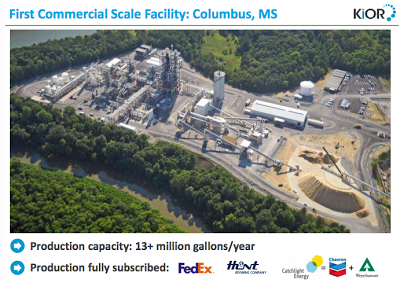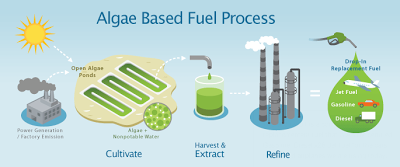While I’m battling some sort of a bug, which hopefully will go away before my trip to the AFPM meeting this coming weekend, here are some big news from the biofuel industry coming from KLM, Kior and Sapphire Energy.
Let’s start with KLM, which announced on March 8 that it is now operating a weekly flight (Flight KL642) from New York to Amsterdam operated by a Boeing 777-200 powered by biofuels supplied by Dynamic Fuel.
Since September 2011, KLM has already been operating a series of biofuel-powered flights on the Amsterdam-Paris route. The company said their goal is to operate 1% of all their flights with biofuel in 2015. The New York-Amsterdam flight will use yellow grease (recycled cooking oil) as feedstock for the biofuel component. KLM said each of the flights will reduce 24 tons of carbon dioxide emissions.
Now, the biofuel supplied by Dynamic Fuel (a JV between Syntroleum and Tyson Foods) is actually biokerosene. If I remember correctly on past press releases from KLM and Dynamic Fuels, only one engine for their previous Amsterdam to Paris flights uses biofuel, which is mixed (about 50% of the biokerosene) with traditional jet fuel.
Dynamic Fuels produces their biokerosene at its 75m gal/year isoparaffinic diesel plant in Geismar, Louisiana, which uses catalytic hydrotreating of non-food grade animal fats and greases supplied by Tyson Foods. The plant is designed to process 550m lb/year (250,000 tonnes/year) of feedstock, from what I recall in my interview with Syntroleum two years ago.
According to Syntroleum’s recent fourth quarter earnings results, Dynamic Fuels sold 35.2m gallons of renewable fuels for the year ended September 30, 2012.
Here is a 2010 video featuring Dynamic Fuels’ synthetic diesel production.
[youtube=http://www.youtube.com/watch?v=zsI1dov9Xbw&w=420&h=315]
With the Kior news, the company announced this week that it has shipped its first cellulosic diesel product from its 13m gal/year facility in Columbus, Mississippi. The facility, which uses proprietary catalysts systems combined with existing Fluid Catalytic Cracking technology, was commissioned in the fourth quarter last year.
The facility uses pine wood chips to produce gasoline and diesel. No statement on where or to whom the cellulosic diesel are being shipped to although based on a recent company presentation, production from the facility is fully subscribed by Catchlight Energy ( a JV of Chevron and Weyerhauser), FedEx, and Hunt Refining.
The company said on its annual report that the Columbus facility is still at limited continuous production, and are not yet in “steady state”.
Kior is currently planning to begin construction of its first standard commercial production facility in Natchez, Mississippi, in the second half of 2013, subject to the company’s ability to raise capital. The facility, which is expected to start in 2015, will have the capacity to produce up to 40m gal/year of cellulosic diesel and gasoline.
The total cost for the planned Natchez facility is estimated at $460m, comprised of $350m for the conversion plant and $110m for a centralized hydrotreating plant. Kior said it plans to raise capital in one or more external equity and [or] debt financings over the next 9 months.
Finally, Sapphire Energy announced yesterday that it has entered a commercial agreement with Tesoro Refining and Marketing Company where Tesoro will purchase algae crude oil from Sapphire Energy’s 100-acre Green Crude farm (which is expected to expand to 300 acres) in Columbus, New Mexico.
Sapphire Energy said it is now producing crude oil daily from algae biomass cultivated in the Columbus farm using wet extraction technology. How much crude algae oil per day? I still have to find out. Sapphire Energy commissioned the Green Crude farm in August 2012 and is said to be operating in a commercial test phase.
The company’s goal once the Green Crude farm has expanded to 300 cultivated acres is to produce 1m gallons per year of finished product or an equivalent of 100 barrels/day of green crude oil using 56 metric tons of carbon dioxide per day.
Sapphire plans to construct a commercial biorefinery, which is expected to start in 2015 and by 2018, produce 5,000 barrels/day of green crude.






3 responses to “Big biofuel news: KLM, Kior, Sapphire”
Unable to view your post. Says it can’t be found.
Hi Tim,
I hope you were able to see it now. Thanks for reading!
[…] Original article […]